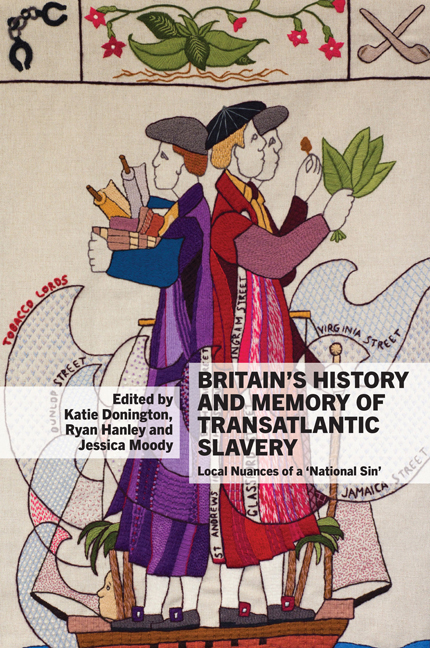Book contents
- Frontmatter
- Contents
- List of Illustrations
- Acknowledgements
- Contributors
- Introduction
- I Little Britain's History of Slavery
- 1 From Guinea to Guernsey and Cornwall to the Caribbean: Recovering the History of Slavery in the Western English Channel
- 2 ‘There to sing the song of Moses’: John Jea's Methodism and Working-Class Attitudes to Slavery in Liverpool and Portsmouth, 1801–1817
- 3 Portrait of a Slave-Trading Family: The Staniforths of Liverpool
- 4 Forgotten Women: Anna Eliza Elletson and Absentee Slave Ownership
- 5 East Meets West: Exploring the Connections between Britain, the Caribbean and the East India Company, c. 1757–1857
- II Little Britain's Memory of Slavery
- Afterword
- Selected Bibliography
- Index
- Plate section
2 - ‘There to sing the song of Moses’: John Jea's Methodism and Working-Class Attitudes to Slavery in Liverpool and Portsmouth, 1801–1817
from I - Little Britain's History of Slavery
- Frontmatter
- Contents
- List of Illustrations
- Acknowledgements
- Contributors
- Introduction
- I Little Britain's History of Slavery
- 1 From Guinea to Guernsey and Cornwall to the Caribbean: Recovering the History of Slavery in the Western English Channel
- 2 ‘There to sing the song of Moses’: John Jea's Methodism and Working-Class Attitudes to Slavery in Liverpool and Portsmouth, 1801–1817
- 3 Portrait of a Slave-Trading Family: The Staniforths of Liverpool
- 4 Forgotten Women: Anna Eliza Elletson and Absentee Slave Ownership
- 5 East Meets West: Exploring the Connections between Britain, the Caribbean and the East India Company, c. 1757–1857
- II Little Britain's Memory of Slavery
- Afterword
- Selected Bibliography
- Index
- Plate section
Summary
During the first two decades of the nineteenth century, the word ‘slavery’ held different meanings in different ports. For some of those working aboard ships and in dockyards in Britain's ‘slave ports’ before 1807, it was perceived, however unfortunately, as the source of their own comfort, or even survival. Slavery generated employment for entire working-class communities; not just sailors, but an entire secondary infrastructure of shipwrights, dockers, warehouse labourers, publicans, carpenters, prostitutes, chefs, weavers, shopkeepers and service staff were employed because of it. Without slavery, some thought, they might starve. In other seaport communities, ‘slavery’ meant something else: not a black spot in Britain's history, but an opportunity to wash it clean. For these working people, it was the suppression of the illegal slave trade after 1807 that ensured opportunities for a steady income – precious indeed, especially during the recession that followed the Napoleonic Wars. But in both settings, ‘slavery’ was more than just a means to employment. It entered popular discourse and so infiltrated their lives beyond the walls of the dockyard, from the pub to the pulpit. Whatever it meant to them, slavery bound British working-class port communities together and fundamentally influenced local narratives of identity.
The same might be said of Methodism. Methodism was more dependent on regional and local exigencies than perhaps any other eighteenth-century evangelical movement. Its root-and-branch organisational make-up, and (at least since its founder John Wesley's death in 1791) decentralised power structure meant that the political character of Methodist sermons differed substantially from one part of the country to another. David Hempton has even gone so far as to suggest that ‘Methodism forged a symbiotic relationship with its host environments,’ mutating to fit in with the prevailing social and political mores of a given locality. This flexibility might account for the movement's massive expansion during the eighteenth century, which cut across class boundaries. Even E.P. Thompson, who disdained Methodism as a fundamentally conservative influence in working-class political culture, conceded that it drew much of its support from ‘wide sections of the proletariat.’ Indeed, increasingly authoritarian attempts to consolidate the movement's management structure, along with a decided shift towards state approval and political anti-radicalism during the Napoleonic Wars, contributed to the emergence of a number of large-scale, locally organised secessionist movements, especially in the northern industrial towns.
- Type
- Chapter
- Information
- Britain's History and Memory of Transatlantic SlaveryLocal Nuances of a 'National Sin', pp. 39 - 59Publisher: Liverpool University PressPrint publication year: 2016



